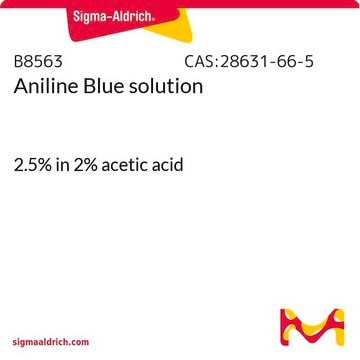95290
Methyl Blue
for microscopy (Bot., Hist.), indicator (pH 9.4-14.0)
Sinónimos:
Acid blue 93, Aniline blue water soluble, Cotton blue, Poirriers blue, Water blue
About This Item
Productos recomendados
grade
for microscopy (Bot., Hist.)
indicator (pH 9.4-14.0)
Quality Level
form
powder or crystals
pH
9.4-14
solubility
water: 0.01 g/10 mL, blue to very deep blue
εmax
≥200 at 310-320 nm
≥400 at 595-605 nm
application(s)
diagnostic assay manufacturing
hematology
histology
storage temp.
room temp
SMILES string
[Na+].[Na+].OS(=O)(=O)c1ccc(Nc2ccc(cc2)\C(c3ccc(Nc4ccc(cc4)S([O-])(=O)=O)cc3)=C5/C=CC(\C=C5)=N/c6ccc(cc6)S([O-])(=O)=O)cc1
InChI
1S/C37H29N3O9S3.2Na/c41-50(42,43)34-19-13-31(14-20-34)38-28-7-1-25(2-8-28)37(26-3-9-29(10-4-26)39-32-15-21-35(22-16-32)51(44,45)46)27-5-11-30(12-6-27)40-33-17-23-36(24-18-33)52(47,48)49;;/h1-24,38-39H,(H,41,42,43)(H,44,45,46)(H,47,48,49);;/q;2*+1/p-2
InChI key
MCPLVIGCWWTHFH-UHFFFAOYSA-L
¿Está buscando productos similares? Visita Guía de comparación de productos
General description
Application
- to stain leaf disks for callose visualization within the cells
- to incubate cells for 4′,6-diamidino-2-phenylindole (DAPI)/septa staining
- as a marker for β-(1-3)-d-glucans or acidic phloroglucinol for the detection of callose and lignin
- in Mann′s stain as it involves a methyl blue-eosin mixture
Storage Class
13 - Non Combustible Solids
wgk_germany
WGK 2
flash_point_f
>572.0 °F - Pensky-Martens closed cup
flash_point_c
> 300 °C - Pensky-Martens closed cup
ppe
dust mask type N95 (US), Eyeshields, Gloves
Elija entre una de las versiones más recientes:
¿Ya tiene este producto?
Encuentre la documentación para los productos que ha comprado recientemente en la Biblioteca de documentos.
Los clientes también vieron
Nuestro equipo de científicos tiene experiencia en todas las áreas de investigación: Ciencias de la vida, Ciencia de los materiales, Síntesis química, Cromatografía, Analítica y muchas otras.
Póngase en contacto con el Servicio técnico








